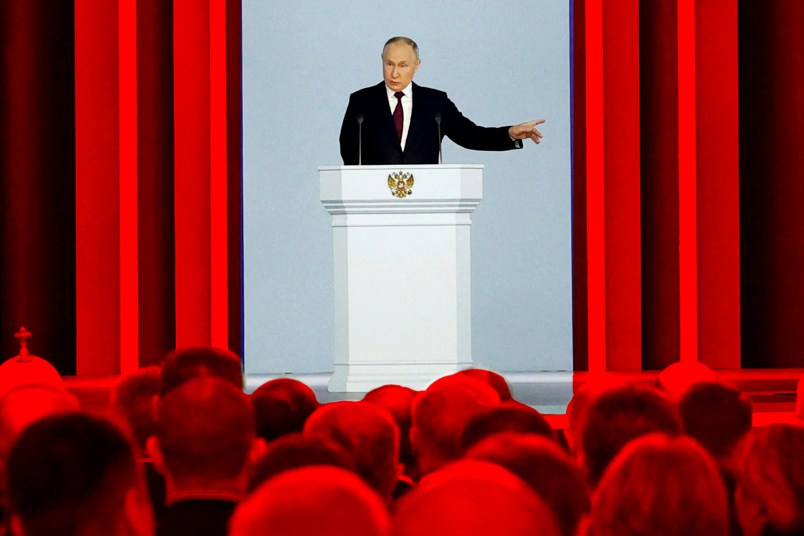One year ago, Russian President Vladimir Putin took one of his final public steps towards war against Ukraine.
In a speech on Feb. 21, 2022, he moved to recognize the independence of two Russia-backed proxy states in Ukraine — and, in doing so, suggested that war was inevitable.
Now, in a new speech one year later, he remains defiant — but has added into his rhetoric ever-more-heaping doses of culture war tropes that for American listeners might sound familiar, pushing a dark worldview and conspiracy theories of the sort favored by Tucker Carlson and the U.S.’s right-wing religious fringe.
Putin set aside time in his Tuesday speech to Russia’s federal assembly to rail against “the destruction of the family, cultural and national identity, perversion, and the abuse of children, up to pedophilia.”
This might sound like a ripoff of an AM radio segment or Chris Rufo stratagem, but similar remarks have constituted a key part of Putin’s public outreach since he launched his murderous invasion of Ukraine last year.
In October, Putin declared that “there are at least two Wests,” and contrasted one of “traditional, mainly Christian values” against a West that was “aggressive, cosmopolitan, neocolonial, acting as a weapon of the neoliberal elite,” before referring to “dozens of genders” and “gay parades.” After the war began and much of the world imposed sanctions on Russia, Putin declared that those fleeing his country were actually being “expelled from” the country’s body-politic, and accused them of being obsessed with slurping oysters and foie gras.
On Tuesday, he repeated similar themes but struck a more mystical tone. He leaned into some of the same culture war tropes that have dominated the American right-wing over the past several years, notably around the integration of same-sex couples into the rest of society and questions over the provision of gender-affirming care to youth.
Putin then suggested in his speech that Western elites try reading “scripture,” which, he says, clarifies that “family is a union of a man and a woman.”
He referred to plans from the Anglican Church to “review the idea of a gender-neutral god.”
“What can you say?” Putin lamented. “Forgive them, God, ‘for they know not what they do.'”
The Russian President added that “millions of people in the West understand that they are being led to a real spiritual catastrophe” and that “the elites are losing their minds.”
“We are obligated to defend our children,” he added.
Fiona Hill, a Russia expert who worked as senior director for European and Russian Affairs at the White House from 2017 to 2019, told the Wall Street Journal last year that similar examples of traditionalist rhetoric were self-consciously aimed at a Western audience, and were part of an attempt to fracture the West.
“What he wants to do is to stoke culture wars as much as possible,” she said.
Putin’s Tuesday cop to the traditionalist far-right did get some desultory praise from mid-level influencers in those circles, but it’s not clear whether it’s permeated deeper than it has in the past.
It also works as part of a broader attempt to cleave Europe away from the United States.
Andrey Pertsev, an independent (and exiled) Russian journalist, described the traditionalist messaging in an article for for Carnegie Endowment last year as an attempt to portray the “‘correct’ Europe,” one which “preserves traditional values.”
“Echoes of this concept can be heard in Putin’s recent speeches, in which he reminds viewers that if Europe wants to retain its identity, it must stand together with Russia,” Pertsev wrote.
Pertsev added that the messaging was all directed at foreign audiences.
“But that discourse is the export model; it’s not suitable for domestic use,” he wrote.



